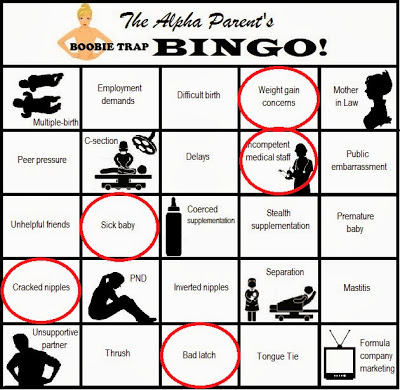 Guilt, resentment, regret – all common millstones of the formula feeding mother. These emotions can be so chronic, that mothers carry them around for years, often becoming bitter and envious in the process. Yet it doesn’t have to be this way. There is a ‘get out of jail card’ for formula feeding mothers. There is salvation.
Guilt, resentment, regret – all common millstones of the formula feeding mother. These emotions can be so chronic, that mothers carry them around for years, often becoming bitter and envious in the process. Yet it doesn’t have to be this way. There is a ‘get out of jail card’ for formula feeding mothers. There is salvation.
This is the story of one mother, whose attempt to breastfeed was sabotaged by medical professionals, family members and her own naivety. Consequently, she became a fully fledged formula feeder. But there’s a twist. She discovered relactation – a way to reverse the cycle of sabotage and win back her maternal dignity.

“I had my mind set on breastfeeding. While pregnant I attending breastfeeding workshops and read book after book. I was induced on my due date, due to Obstetric Cholestasis of Pregnancy. Labor was a long process, induced on a Tuesday and finally born on the Friday morning. The birth itself wasn’t exactly the miraculous experience I had dreamed of – forceps with rotation and a 3rd degree tear. It was my first baby and I was thoroughly exhausted and overwhelmed by the whole ‘event’.
While I was recovering, I was told by one midwife that my nipples were perhaps too large for breastfeeding, so I should ‘watch that’ as it may cause ‘problems’. What a great start!
Jaundice
On Saturday I was allowed to go home, but it was short lived. I was readmitted on Sunday because my baby had severe jaundice, requiring phototherapy. We spent 5 more days in hospital, and during this time I was advised that my baby ‘must’ be given formula top ups to flush the jaundice out of her system.
Meddling in-laws
Thankfully after arriving home, I was permitted to return to exclusive breast feeding, which I duly did, much to the disapproval of my in-laws. I felt my in laws were never supportive of my choice to breastfeed. Perhaps it was genuine ignorance as my mother in law told me that she could never feed any of her 7 children as she never produced any milk, and my father in law told me over the phone that perhaps ‘the baby wasn’t getting enough’ – when he breastfed, I’m not sure?? It was sadly the cause of a permanent shift in our relationship, as for me, they didn’t support me at a time when I was possibly the most vulnerable I had ever been in my adult life: I was a new mum, had a rough delivery, and was still unwell (the OC of pregnancy made me very unwell). I needed support and encouragement rather than negative comments.
Weight issues
After 2 weeks of exclusive breastfeeding my baby was gaining weight, however apparently she was not gaining ‘sufficiently’ so the midwife instructed that I stop feeding on demand and ‘force’ my baby to go 3 hourly between feeds. To be honest, I felt exasperated. Her advice seemed to go against everything that I had read. Yet she wasn’t the sort of midwife that you would argue with (especially when it was your first child). I just wanted someone to help me and my baby and she was very clear that she was the professional and that it was advisable to follow her guidance.
So I followed her instructions and what do you know – my baby continued to fail to gain weight at the desired rate. At 4 weeks old my baby was admitted to hospital. Her eventual diagnosis was Gastro Oesophageal Reflux Disease.
The switch to formula
By this time, quite frankly, I was done in. Concerned about my baby, confused by the conflicting advice offered by so many people (one paediatric nurse told me ‘a mars bar is a good way to boost your milk supply’ without even finding out whether I had a problem with my milk supply – I knew I didn’t as I could pump 3-4 ozs after a feed, if anything it could have been a latching issue). I was still trying to recover my own health and at this point I decided to take their ‘advice’ and formula feed, feeling that this would solve all our ‘issues’.
Recognising my mistake
As I began to feel healthier and stronger, I came to resent the fact that I had stopped breastfeeding.Feeding my baby naturally was something I had badly wanted to do and I was disappointed that I had stopped so soon.
I felt embarrassed that I was using formula. There is so much information about the benefits of breastfeeding. I never EVER let anyone give my baby a bottle, not even my husband. If I wasn’t breastfeeding her, I still wanted to be the sole source of nourishment in her eyes. I followed all the steps you would when breastfeeding, eye contact, talking etc. We would never have a bottle ‘on the go’, it was always as intimate an experience as possible. These small steps helped me to feel a tiny bit better.
When my daughter was 10 weeks old I spoke to my mum about how deeply disappointed I was at abandoning my breastfeeding goals, and she simply replied ‘start again then’. Quite confused by this I asked her what she meant and she said, ‘well I never really thought of it as supply and demand, more of a demand and supply’ the more you put baby to breast the more milk you will get, you could breastfeed an adopted baby if you really wanted to’.
With this in mind I began to research relactation. I ordered the WHO guide to Relactation, rented a dual breast pump from the NCT, took all pacifiers away and dug my heels in.
The relactation journey
I made an appointment to see my local doctor to discuss the possibility of using Domperidone to help kickstart the relactation process. The doctor however, basically told me not to bother as it would be far too much effort. In all honesty, this only made me more determined.
I used the breast pump every 3 hours day and night, without fail for the next 8 weeks or so, in between this I put baby to breast. My mother was totally supportive. Motivational texts would come through in the small hours of the night and she’d come and do all the ‘boring’ jobs rather than asking to cuddle the baby – giving us time to bond and feed.

Other allies in my relactation mission were – books! I found the WHO guide fantastic for gaining a full understanding of how my body was working, and ‘The Breastfeeding Mother’s Guide to Making More Milk’ was invaluable for my positioning, attachment and generally spurious queries that arose on an almost daily basis – that said, it was nothing different to the answers my mother would always give me, but I did have it to hand at 3am!
Pumping every 3 hours around the clock was hard, thankless work, however I think my determination to succeed carried me through. Once my milk was fully re-established I could leave it longer (5-6 hours) on occasion. Perhaps the hardest challenge of relactation was trying to figure out how to entertain the baby throughout my busy pumping schedule. We’d move from room to room, sometimes in a cradle, sometimes on a play mat, always with my hanging over her chatting, pumps doing their thing. One day, I was pumping sat in my sister’s kitchen, when a wasp started to dive bomb me, that was pretty challenging! lol.
What relactation meant to me
For me, relactation was essential to my self esteem. I went on to successfully breastfeed our daughter till she was 14 months old.
When our 2nd was born in March last year, I hooked out my ‘Making More Milk’ book again (for middle of the night referencing) but more importantly, I trusted myself. We’re still breastfeeding (albeit it only once a day) now. He is 19 months old.
The relactation experience gave me such an understanding of breastfeeding that I encountered no problems with feeding my son – this time I finally had the experience I had anticipated (but not had) with my first child. The whole journey was a very emotional time for me and it made me very determined to become a breastfeeding counsellor once both my children are at school, so I can devote some time to providing others with the knowledge and support that I feel I didn’t get.
People who sabotage
Writing this story has encouraged me to reflect upon my experience, and in particular, the people I encountered (midwives, inlaws, doctors) who sabotaged my breastfeeding efforts. I’ve come to think that some people feel disappointed by their own breastfeeding experiences and perhaps don’t want to see others succeed at something they feel they didn’t succeed at/ missed out on. I felt such disappointment, but I didn’t turn this powerful emotion onto other people. Instead, I used it for positive means – to drive my relactation mission.
Message to formula feeding mothers
My message to formula feeding mums that are unhappy is – you can change, if you want to! I didn’t even know about relactation until my mother mentioned it. On balance, it was surprisingly easy, just time and commitment. I think it’s important to look closely at the reasons why you are unhappy formula feeding. I knew that if I didn’t do something about it, it would ‘stay’ with me for the rest of my life. In fact, I did hypnobirthing for my 2nd baby and breastfeeding was one of the points I took hypnosis for, recounting my experience first time round still reduced me to tears 3 years on. It meant that much to me.”

Get your own blank Bingo Card here.
Email me with your story.










